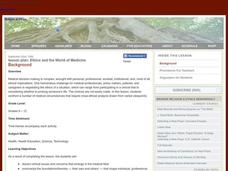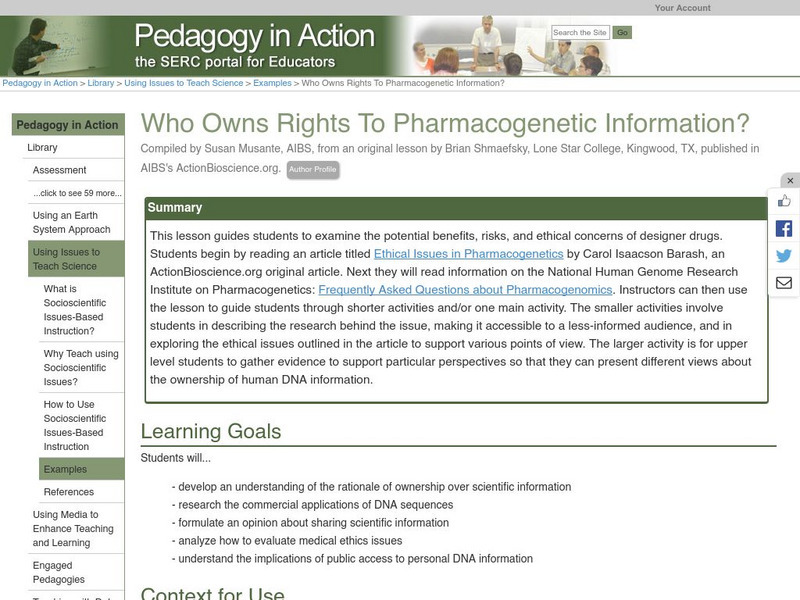Curated OER
The Right to Die - A Role Playing Activity
Learners are assigned various roles to play in simulation intended to demonstrate the difficult choices involved in keeping relative on a life support system. They research a case, prepare their roles, and present their positions to the...
Curated OER
Teaching Bioethics
Use this guide for incorporating bioethics into your biology curriculum or for teaching a unit on the topic. A syllabus for an entire year is also available. The resource provides lists of online, video, and printed resources; however,...
Curated OER
Ethics and the World of Medicine
Students examine ethical issues in the field of medicine. For this ethics lesson, students explore primary and secondary sources regarding the discernment that medical professionals are presented with as they treat illnesses. Students...
National Institutes of Health
Ncbi: What Does Cruzan Mean to the Practicing Physician?
Discusses patient rights in regards to refusing treatment that may save their lives. The Supreme court held that patients have a constitutional right to refuse treatment.
PBS
Pbs Bloodlines: Technology Hits Home
This site is a must see for any lesson or unit on biotechnology! It is a companion to the PBS video "Bloodlines: Technology Hits Home," although it can certainly be used without the video. It's a fantastic site that will challenge...
PBS
Pbs Bloodlines: Making Precedent
Excellent site where students are challenged to read several case studies and make choices about what they would do in the situation. After they choose they are presented with some of the consequences that their decision may produce in...
Science Education Resource Center at Carleton College
Serc: Who Owns Rights to Pharmacogenetic Information?
This activity explores ethical issues around ownership of scientific and human DNA information. Students learn about the benefits and risks of new drugs, and related ethical matters, and what the concerns are about sharing of genetic...
Nature Research
Scitable: Genetics and Society
Get an in-depth look at the ethical, legal, and social implications genetic technologies have on society. Explore the ethical considerations that genetics has on our society with the advances in genetically-tailored treatments, genetic...
University of Virginia
U of Virginia: Bad Blood: The Tuskegee Syphilis Study
Participants in the Tuskegee Syphilis Study were never told that they had syphilis. Instead, the doctors and scientists said they had "bad blood." Find out what took place during this study, and the social and political consequences...
PBS
Pbs: An Apology 65 Years Late
An article covering former President Clinton's apology to the survivors and family members of the Tuskegee Syphilis Study. Dated May 16, 2007.
Centers for Disease Control and Prevention
Centers for Disease Control: The Tuskegee Timeline
What was the Tuskegee Syphilis Study? Find out more about this experimental study when you visit this site. The CDC compiled a timeline outlining the events of this tragedy.
The Washington Post
Mice Stem Cells Made Without Harm to Embryos
Scientists have found that stem cells can be grown without destroying healthy embryos. This article reviews the discovery and comments on it's ethical implications.
Black Past
Black Past: Tuskegee Syphilis Experiment (1932 1972)
In this encyclopedia entry you'll learn about the Tuskegee Syphilis Experiment, in which scientists infected blacks with syphilis to gather scientific data. There is a link to a website to gain more information about this grave ethical...














